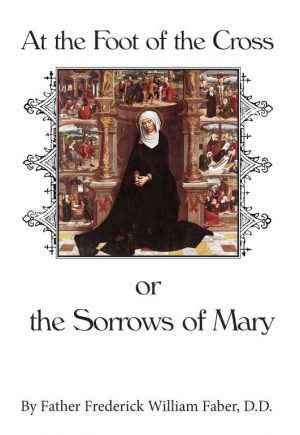The Foot of the Cross or the Sorrows of Mary
By Father Frederick William Faber, D.D.
Having only ever read brief books on Our Lady’s Seven Dolours, this large work, written in 1855, seemed a good way to learn a great deal more about - so as to hopefully increase a great deal more - devotion to the Blessed Mother via deeper appreciation of her Sorrows. In the preface it was made known that the well-revered priest-author was a Tertiary of the Servite Order, which seemed to more so qualify him to preach on this subject, and it was soon made evident that his treatise was undoubtedly a beautiful labour of an overflowing love for God and the Blessed Virgin from a devoted servant. His words have the effect of sparking more of that fire of Charity and love for Our Lady in the reader!

“The Martyrdom of Mary” being the introductory chapter has a very flowery and kind of gushy style. Deep and melancholic souls would probably thoroughly enjoy and appreciate its effusive and poetic quality. I did initially but it got a bit much after a while, and I was wondering if getting through 544 large pages of this “verbal bouquet” would prove somewhat mildly “penitential.” However, from the start of Chapter Two with the details of each of the Seven Sorrows being explained in-depth, the writing style became more narrative, factual and more directly to the point, yet still beautiful and very moving – these chapters are truly inspiring and turned out to be invaluable in ways other than being “penance” of any sort. If you’re not the poetry type, don’t be tempted to skip over the flowery first chapter though, because that is also an extremely valuable section, containing many beneficial insights such as:
“…we never advance more rapidly in love of the Son than when we travel by the Mother, and that what we have built most solidly in Jesus has been built with Mary.”
“We must know, as far at least as lies in our power, the immensity of her dolors, why God permitted them, what were the fountains of them, and what their characteristics, how it was that she could rejoice in them, in what way the Church puts them before us, and what should be the spirit of our devotion to them.” (Those questions are answered in that chapter.)
“Her sufferings close the mouth of complaint forever. With sweet restraint and unanswerable persuasiveness they impose silence on all the suffering children of our heavenly Father. The saints can doubt no longer that suffering is the one grand similitude of Christ. We too in our extreme lowness, whose patience is of so thin a texture that it was threadbare almost when it was new, learn, not to be silent only, but to bear with gentleness, and even wistfully to think the time may come when we shall actually love that suffering which seems to be the golden coin in which love repays our love.”
“Never then must we put away from ourselves the thought of this moderation of Mary in her woes. There was nothing wild, nothing unsettled, nothing dramatic, nothing passionate, nothing demonstrative, nothing excessive; but she stood in calmest, queenliest dignity, quiet, not as a sweet evening landscape, or a noontide summer sea, or a green wood at dawn, or a moonlit mountain-top, or as any other image in the poetry of nature, but quiet, in her measure and degree, as the Divine Nature of our Lord while the tumult of the Passion was trampling His Human Nature to death. Her tranquility was the image of that tranquility. It was one of many participations in Himself which Jesus gave to her in those dark hours.”
In recounting a vision of Our Lord to St. John: “…he heard her [Mary] ask Jesus to grant some especial favor to those who should keep her dolors in remembrance. Our Lord replied that He would grant four particular graces to all those who should practice this devotion. The first was a perfect contrition of all their sins some time before death: the second was a particular protection in the hour of death: the third was to have the mysteries of the Passion deeply imprinted in their minds: and the fourth a particular power of impetration granted to Mary’s prayers on their behalf.”
“It [devotion to Our Lady’s Dolours] produces in our minds an extreme tenderness toward our blessed Lord, united with the profoundest reverence...But out of this tenderness comes also a great hatred of sin. If God were to let us choose which of the great and extraordinary gifts that He has given to His Saints should be conferred upon ourselves, we could not do better than ask for that piercing and overwhelming hatred of sin which some have had. It is a gift which lies at the root of all perfection, and is the supernatural vigor of all perseverance. It is at once the safest and the most operative of all singular graces. Devotion to our Lady’s dolors is a great help both to acquiring the hatred of sin as a habit, and to meriting it as a grace.”
What more could we need to motivate us to immerse ourselves in this substantial exposition of this precious devotion?
In honour of the Month of Our Lady’s Seven Sorrows (and of the Holy Cross) this title will be on sale for the entirety of September 2020, and will be available for backorder if our stock sells out during this period, so as to make it easily available to all.
This portion about the striking power, efficacy and need of this devotion is worthy of our careful consideration, too:
“Yet when we think of the Sacred Heart of Jesus, of the immensity of His love for Mary, and of the great part of the Passion which it was to Him to see her suffer, we cannot for a moment doubt, without thinking of obligation, the extreme persuasiveness to Him of devotion to her dolors, a devotion which He Himself began, a devotion which was actually a solid part of His ever-blessed Passion. We draw Him toward us the moment we begin to think of His Mother’s sorrows. He is beforehand, says St. Anselm, with those who meditate His mother’s woes. And do we not stand in need of power in heaven? What a great work we have to do in our souls, and how little of it is already done? How slight is the impression we have made yet on our ruling passion, on our besetting sin! How superficial is our spirit of prayer, how childishly timid our spirit of penance, how transitory our moments of union with God! We want vigor, determination, consistency, solidity, and a more venturous aspiration. In short, our spiritual life wants power. And here is a devotion so solid and efficacious, that it is eminently calculated to give us this power, as well by its masculine products in the soul as by its actual influence over the Heart of our Blessed Lord.”
What a bonus that this priceless work is currently in print and therefore available to us now!
